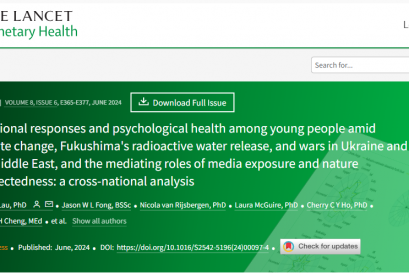News
HKBU SCE study published in The Lancet Planetary Health unveils how young people’s emotional engagement with multiple global crises simultaneously can compound the risks to their psychological health
06 JUN 2024
The School of Continuing Education, Hong Kong Baptist University (SCE, HKBU), in Hong Kong, China, in collaboration with Edge Hill University (EHU) in the UK, recently published a cross-national online survey study in The Lancet Planetary Health. This study examined the psychological health of 2,000 participants aged 18 to 29 in relation to three major global crises: climate change, Ukraine and Gaza wars, and the release of radioactive wastewater from Japan. The survey included respondents from China, the UK, the US, South Africa, and Portugal. Researchers analysed individual emotional responses to each global crisis, evaluating 18 distinct emotional reactions (e.g., anger, concern, disgust) and the impact of media exposure and nature connectedness on psychological health outcomes. The findings were published in The Lancet Planetary Health, a publication from The Lancet Group, on June 5, 2024.
A novel investigation into the precarious outlook of young people
Dr. Sam Lau, lead author of the study and person-in-charge of the Research Centre for Environment and Human Health at SCE, HKBU, explains, “In today’s digital age, young people are more connected and engaged with global events through social media than ever before. This constant exposure to real-time updates on global crises can significantly impact their mental health.”
“Young people are more likely than older generations to feel a moral obligation to be concerned about and support other countries in times of crisis, a sentiment that initially grew from the climate change movement but now extends to various global issues,” said Dr. Sam Lau, who explained, “Other analyses we have done showed that young people spend an average of more than eight hours per day using electronic devices, with the most frequent use on social media, in turn, may lead to their behavioural change.”
Emotional Responses and Psychological Health
The study distinguishes emotional responses into two main groups: unique emotions like anger, outrage, and disgust specific to each crisis, and common emotions such as sadness, fear, helplessness, and guilt shared across multiple crises. These emotional engagements, both positive and negative, were found to negatively impact psychological health. Notably, nature connectedness emerged as a crucial factor in mitigating these negative effects, particularly in relation to ecological crises.
Media exposure was strongly linked to emotional engagement, while the amount of media consumption influenced psychological health predominantly through war-related crises. Each global crisis contributed uniquely to psychological health outcomes, with the climate crisis having the most substantial effect.
Cultural Differences and Psychological Health
The study also revealed significant cultural differences in emotional responses and psychological health outcomes. Chinese respondents exhibited distinct patterns, with greater emotional engagement and negative health outcomes from Japan’s radioactive wastewater release. Dr. Dorothy Tse, Senior Lecturer in Psychology, EHU, further explained that the study underscores the importance of considering cultural lenses and social media representations in understanding global crises' psychological impact.
Dr. Sam Lau and his team advocate for further investigations to explore these cultural effects in greater depth. Such insights could enhance the understanding of youth psychological health and inform strategies to support young people as they navigate the complexities of a rapidly changing world.
“We should strive for international cooperation to mitigate the physical and psychological impacts of global crises,” said Dr. Cherry CY Ho, Lecturer of the Division of Nursing Education, SCE, HKBU. Dr. Sam Lau explained, “Nature connectedness, as demonstrated in our study, shows immense potential in mitigating the psychological health burden of ecological crises. Policymakers should consider how to reconnect young urban populations with nature as a means of building resilience in psychological health against new waves of global crises.”
Professor Ronald CK Chung, Dean of School of Continuing Education, HKBU, added, “Amidst the global crises turbulence, the overwhelming negative emotions among young people reflect the need for environments that support their psychological health and empower them to engage in meaningful solutions. Hence, addressing these issues is crucial for the well-being of the future generations.”
The full paper can be accessed here: https://www.thelancet.com/journals/lanplh/article/PIIS2542-5196(24)00097-4/fulltext
About the international research team
This research was conceived and led by Dr. Sam Lau, Person-in-charge of Research Centre for Environment and Human Health, SCE, HKBU with the support of the Research Centre team (Dr. Cherry Ho, Mr. Jason Fong and Mr. Marco Cheng) and in collaboration with the UK team, including Dr. Dorothy Tse, Dr. Nicola van Rijsbergen and Dr. Laura McGuire of Department of Psychology, Edge Hill University.
About the Research Centre for Environment and Human Health, SCE, HKBU
The Research Centre for Environment and Human Health, SCE, HKBU was established in 2021 with the funding support from Research Grant Council of Hong Kong, China (UGCIS(R) 23/20, funding period from 1 January 2021 to 31 December 2023). The Research Centre serves as an interdisciplinary research platform to promote multidisciplinary research in order to enhance the understanding of key issues and benefits related to the environment-health nexus, explore integrative solutions relating to environmental change and human health, and promote to the public, an understanding of environmental health and sustainability.

